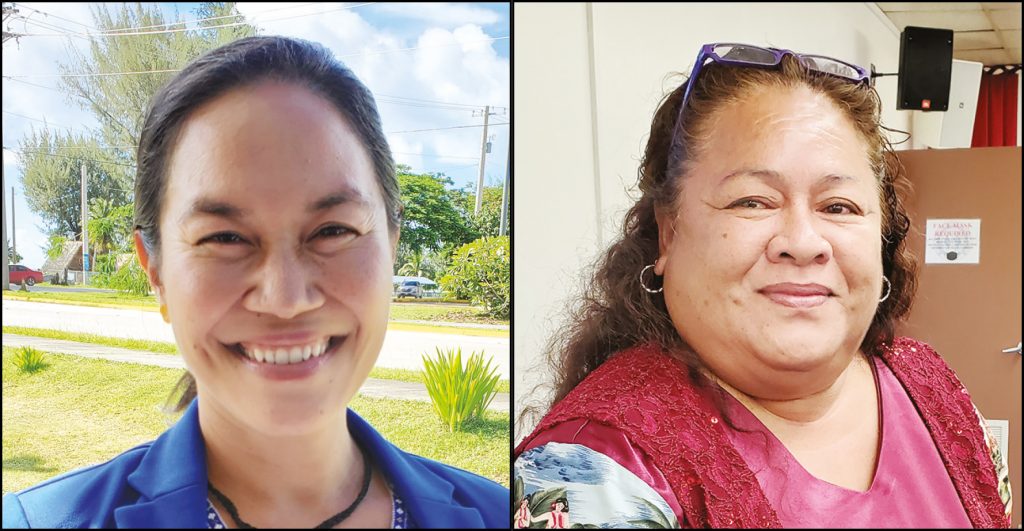Local bill requiring owners to scoop pets’ poop OK’d
The Saipan and Northern Islands Legislative Delegation Committee on Health and Welfare, chaired by Rep. Christina E. Sablan (D-Saipan), adopted yesterday, with amendments, a local bill which would make dog owners responsible for the disposal of their pets’ fecal waste.
At the committee’s public meeting held in the House of Representatives chamber, members agreed to recommend for the passage of House Local Bill 22-19, Committee Substitute 1, to SNILD at their next session.
Under the bill, each person who owns or controls a dog must promptly store and remove any feces left behind by that dog on any public property or right of way or on any private property, and sanitarily dispose of it.
Rep. Denita K. Yangetmai (D-Saipan), who is the author of the bill, said on behalf of some concerned citizens who are in support of her legislation, said this bill if becomes a law will mandate dog owners to scoop up after their pets emptied the contents of their stomach.
“We all know that one of the reasons that pet dogs want to go for a walk is mostly to empty their stomachs,” Yangetmai said.
She said some people may laugh at this bill, but if they step back and observe the many dog owners that walk their dogs just to poop on the walkway, along the beautiful Saipan lagoon, at the parks, on the roads, and other areas, they will see the many disgusting and very unsanitary poops.
Yangetmai said tourists, who are the main drivers of the CNMI’s economy, are slowly making a comeback.
“And we would want them to return to their homeland with great stories about their stay on Saipan, and taking pictures of the sunset and ocean on the west side of the island without any issues with stepping on dog poop,” she said.
Sen. Edith E. DeLeon Guerrero (D-Saipan) said one thing is not being addressed in the legislation that she believes they could insert through an amendment is about environmental protections.
“And today, we know that our landfill, we’re having issues as well. And I feel that the bill should also perhaps insert what kind of material is to be used to collect the dog poop by the owners,” DeLeon Guerrero said.
She said based on her research, obviously there’s a lot of bags that could be used, but one report states that it takes about 10 years to 1,000 years for a dog poop bag to decompose.
“And that’s a concern,” the senator said.
DeLeon Guerrero said, however, the research also shows that there is an alternative such as taking a few sheets of newspaper, which is biodegradable, and disintegrates much faster than any other material.
She said additionally, she knows that the CNMI is concerned about removing plastics in the community and becoming much more environmentally friendly and responsible throughout the world regarding plastics.
“So I think it’s important that we might as well address it in the current legislation if we are to move forward to protect our landfill, our water,” DeLeon Guerrero said.
Sablan said she is aware that there are already alternatives like biodegradable and compostable bags for the disposal of the dog solid waste that she has actually seen in stores.
“They are available. They have been available in stores even here on this island. And can also be ordered online,” Sablan said.
She noted that there is also pending legislation that would restrict the use of plastic bags generally in stores.
Sablan said as Yangetmai stated in her comments that it might be something that a lot of people in this community don’t yet take seriously, but dog solid waste is actually classified as a pollutant.
She said dog solid waste is considered a biohazard even by the U.S Environmental Protection Agency and it is a way that viruses and parasites can be transmitted to people and to other pets.
“And then of course, it impairs water quality. And when you have dogs’ solid waste all over the place with everybody’s pets just going unattended and pet owners not cleaning up after them, that really does add up to a community-wide problem and a nuisance,” Sablan said.
The committee chair then summarized her proposed amendments to the bill. The committee members unanimously approved Sablan’s proposed amendments.
Among the amendments is including a subsection that basically states that violations shall be a civil infraction punishable by a fine of not less than $25 and not more than $50 for each violation.
Sablan said this is to put some teeth and also provide some clarity as to who is responsible for the enforcement of the rules and also for the enforcement.
She proposed to insert a new subsection stating that any owner or keeper who requires the use of a Disability Assistance Dog “shall be exempt from the provisions in this section, while such dog is being used for that purpose.”
“This is just following the comments that we received from the agencies that it needs to be clear who’s responsible for enforcement,” she said.
Sablan said the municipalities of Saipan and the Northern Islands are further authorized to administer and enforce rules and regulations adopted.




























